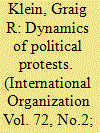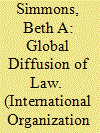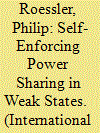|
|
|
Sort Order |
|
|
|
Items / Page
|
|
|
|
|
|
|
| Srl | Item |
| 1 |
ID:
160339


|
|
|
|
|
| Summary/Abstract |
Do legal amnesties for combatants help end civil wars? International policy experts often take it for granted that amnesties promote negotiated settlements with rebels. However, a large number of amnesties are followed by continued fighting or a return to the battlefield. What, then, are the factors that make amnesties effective or ineffective? In this article I use a disaggregated data set of all amnesties enacted in the context of internal war since 1946 to evaluate a bargaining theory of amnesties and peace. Testing hypotheses about conflict patterns using models that account for selection, I find that (1) only amnesties passed following conflict termination help resolve civil wars, (2) amnesties are more effective when they are embedded in peace agreements, and (3) amnesties that grant immunity for serious rights violations have no observable pacifying effects. These policy-relevant findings represent a new breakthrough in an ossified “peace versus justice” debate pitting security specialists against global human rights advocates.
|
|
|
|
|
|
|
|
|
|
|
|
|
|
|
|
| 2 |
ID:
160342


|
|
|
|
|
| Summary/Abstract |
The links between protests and state responses have taken on increased visibility in light of the Arab Spring movements. But we still have unanswered questions about the relationship between protest behaviors and responses by the state. We frame this in terms of concession and disruption costs. Costs are typically defined as government behaviors that impede dissidents’ capacity for collective action. We change this causal arrow and hypothesize how dissidents can generate costs that structure the government's response to a protest. By disaggregating costs along dimensions of concession and disruption we extend our understanding of protest behaviors and the conditions under which they are more (or less) effective. Utilizing a new cross-national protest-event data set, we test our theoretical expectations against protests from 1990 to 2014 and find that when protesters generate high concession costs, the state responds in a coercive manner. Conversely, high disruption costs encourage the state to accommodate demands. Our research provides substantial insights and inferences about the dynamics of government response to protest.
|
|
|
|
|
|
|
|
|
|
|
|
|
|
|
|
| 3 |
ID:
160337


|
|
|
|
|
| Summary/Abstract |
Why have states created international laws to regulate internal armed conflicts? This article is the first to theorize the emergence and design of these international rules, focusing on Common Article 3 to the 1949 Geneva Conventions. Drawing on original multicountry archival research, I develop the mechanism of forum isolation to explain the origins of Common Article 3, demonstrating the importance of social opprobrium pressure to explain why Britain and France switched from staunch opposition to support and leadership in 1949. Specifically, forum isolation pressured these European empires to concede and to react strategically behind the scenes, saving face and safeguarding their security interests by deliberately inserting ambiguous language in the text of Common Article 3. This move later facilitated states' avoidance of this rule in many conflict cases.
|
|
|
|
|
|
|
|
|
|
|
|
|
|
|
|
| 4 |
ID:
160335


|
|
|
|
|
| Summary/Abstract |
In the past few decades new laws criminalizing certain transnational activities have proliferated: from money laundering, corruption, and insider trading to trafficking in weapons and drugs. Human trafficking is one example. We argue that criminalization of trafficking in persons has diffused in large part because of the way the issue has been framed: primarily as a problem of organized crime rather than predominantly an egregious human rights abuse. Framing human trafficking as an organized crime practice empowers states to confront cross-border human movements viewed as potentially threatening. We show that the diffusion of criminalization is explained by road networks that reflect potential vulnerabilities to the diversion of transnational crime. We interpret our results as evidence of the importance of context and issue framing, which in turn affects perceptions of vulnerability to neighbors' policy choices. In doing so, we unify diffusion studies of liberalization with the spread of prohibition regimes to explain the globalization of aspects of criminal law.
|
|
|
|
|
|
|
|
|
|
|
|
|
|
|
|
| 5 |
ID:
160341


|
|
|
|
|
| Summary/Abstract |
From 1960 to 2000, manufacturing supply chains became global. To what extent has this growth in offshore outsourcing and foreign direct investment affected industrial attitudes toward trade liberalization? Using data on public positions of US firms and trade associations on all free trade agreements since 1990, I show that foreign direct investment (FDI) and input sourcing are the primary drivers of support for trade liberalization. Direct import competition and export opportunities play a secondary role in shaping support for free trade agreements. This work therefore adds to the literature on the politics of globalization by providing systematic evidence of a link between global supply chains and industrial preferences, and by developing a new model of the determinants of industrial attitudes toward trade.
|
|
|
|
|
|
|
|
|
|
|
|
|
|
|
|
| 6 |
ID:
160336


|
|
|
|
|
| Summary/Abstract |
Why do some countries fail to govern their territory? Incomplete domestic sovereignty, defined as the absence of effective state authority over territory, has severe consequences in terms of security, order, economic growth, and human well-being. These negative consequences raise the question of why such spaces remain without effective authority. While the international relations literature suggests that state weakness persists because of an absence of war and the comparative politics literature treats political underdevelopment as the consequence of domestic factors that raise the costs of exercising authority, these views are incomplete. I argue that hostile neighbors weaken state authority over territory through a strategy of foreign interference. Foreign interference in domestic sovereignty is a powerful instrument of statecraft that can yield domestic and foreign policy benefits. I investigate the effects of hostile neighboring states through a cross-national, within-country statistical analysis utilizing a novel indicator of state authority, and pair this analysis with a qualitative case study of Malaysian subversion of the Philippines in the 1970s. Together, this evidence shows how this international factor is an underappreciated yet important contributor to weak state authority even after accounting for domestic factors. The study's conclusions challenge our understanding of the effects of international politics on internal political development.
|
|
|
|
|
|
|
|
|
|
|
|
|
|
|
|
| 7 |
ID:
160338


|
|
|
|
|
| Summary/Abstract |
The most important international human rights norms are legalized or codified in international treaty law. Yet pernicious practices at odds with these norms endure and sometimes even increase after legalization. According to conventional wisdom, this is because agents commit to but do not comply with international law and the underlying norms. I develop a theory of evasion to explain why norm violations persist even when states technically comply with the law. Because legalization transposes social norms into international law imperfectly, it creates gaps between laws and underlying norms. Because of these norm-law gaps, legality and normative appropriateness will diverge. States caught between opposing pressures from pro-violation and pro-compliance groups exploit this gap through what I call evasion—the intentional minimization of normative obligations that technically complies with international law but violates underlying norms. I demonstrate the theory's empirical purchase in the cases of the French expulsion of Roma immigrants and the Czech school segregation of Roma children. Under the cover of technical compliance with the law, these states violated the norm of racial equality. The argument cautions that the good news about law compliance is not necessarily good news about norm compliance, broadens our understanding of norm violators' agency, and has practical implications for human rights advocacy.
|
|
|
|
|
|
|
|
|
|
|
|
|
|
|
|
| 8 |
ID:
160340


|
|
|
|
|
| Summary/Abstract |
Power sharing, in which elites from rival societal groups agree to share control of the central government, is a key source of domestic peace, enabling states to escape devastating cycles of exclusion and civil war. Yet the conditions giving rise to inclusive governance are not well understood. In contrast to existing scholarship that emphasizes the importance of external third-party mediation or strong formal institutions, we point to the structural roots of power sharing in which political inclusion stems from the distribution of societal power and the balance of threat capabilities it produces. Only when both the ruling group and a given rival group possess strong mobilizational capabilities, such that each could credibly threaten to recapture state power if excluded from the central government, does self-enforcing power sharing emerge. A strong rival induces the ruler to commit to power sharing and to reluctantly accept coup risk over civil war risk. The ruling group's own threat capabilities, in turn, constrain rivals from trying to convert their share of power into absolute power. Supported by extensive quantitative and qualitative evidence with particular reference to weak states in sub-Saharan Africa, we shed light on the conditions under which the distribution of violence within a state underwrites a peaceful and productive equilibrium. In doing so, we rethink how scholars approach the study of civil war. Rather than conceiving of it in terms of effective resistance, we model civil war as a contest for state power shaped by groups’ capabilities to project force in the capital.
|
|
|
|
|
|
|
|
|
|
|
|
|
|
|
|
|
|
|
|
|